
The May 2015 issue of Choral Journal features an article titled “About the Music: An Interview with Ann Howard Jones” by Sean Burton. You can read it in its entirety online at acda.org/choraljournal. Click “Search Archives” and choose May 2015 from the dropdown menu. Below is an excerpt from that article.
_____________________________
What was your childhood formation as a musician?
I was surrounded by music from as early as I can remember. It was an era when most households had a piano whether it was played or not, and while my mother could play a little, her mother was an active church organist and singer. One of my first memories was begging to go to my grandmother’s church to watch rehearsal. I don’t know why exactly, but I was fascinated by what was going on.
On the other side of the family, everyone was playing instruments by ear. It used to amaze me how they could do that so well. My grandfather would sit at the piano and improvise songs for us on Sunday afternoons. I am not sure what kind of impact that ultimately made, but it certainly was not unusual for music to be constantly present in our household.
Remember, I grew up in the small town of Cresco on the far reaches of eastern Iowa, and much of the music making was in the home. Because of programs like Community Concerts, we heard the Robert Shaw Chorale, the Roger Wagner Chorale, and other groups of that level on tour, but mostly the music we experienced was that which we made.
Would you share some thoughts on how you train conductors?
It is important that every student be very well-informed historically and analytically, so there is a significant emphasis on advanced studies in music history and theory here at Boston University. The platform from which we come merits study, and to be credible artistic leaders, we must know it thoroughly. We have to know how the music is constructed and its context in order to reveal the composer’s intent. The more well-informed, historically grounded, and analytically secure a conductor can be, the stronger they can lead.
Conducting students should always participate in ensembles, because they have to know not only how to lead ensembles but how to be in ensembles. In terms of how we teach teachers, I think the conductor should establish some basic disciplines then strive to attain that which may seem unattainable by encouraging ownership from the musicians from day one. Let’s not forget there is also the need to be able to express oneself. We lean heavily on the ability to speak articulately and how to utilize gesture effectively and appropriately.
_____________________________
Read the rest of this article (and more!) in the May 2015 issue of Choral Journal, available online at acda.org.


Leave a Reply
You must be logged in to post a comment.